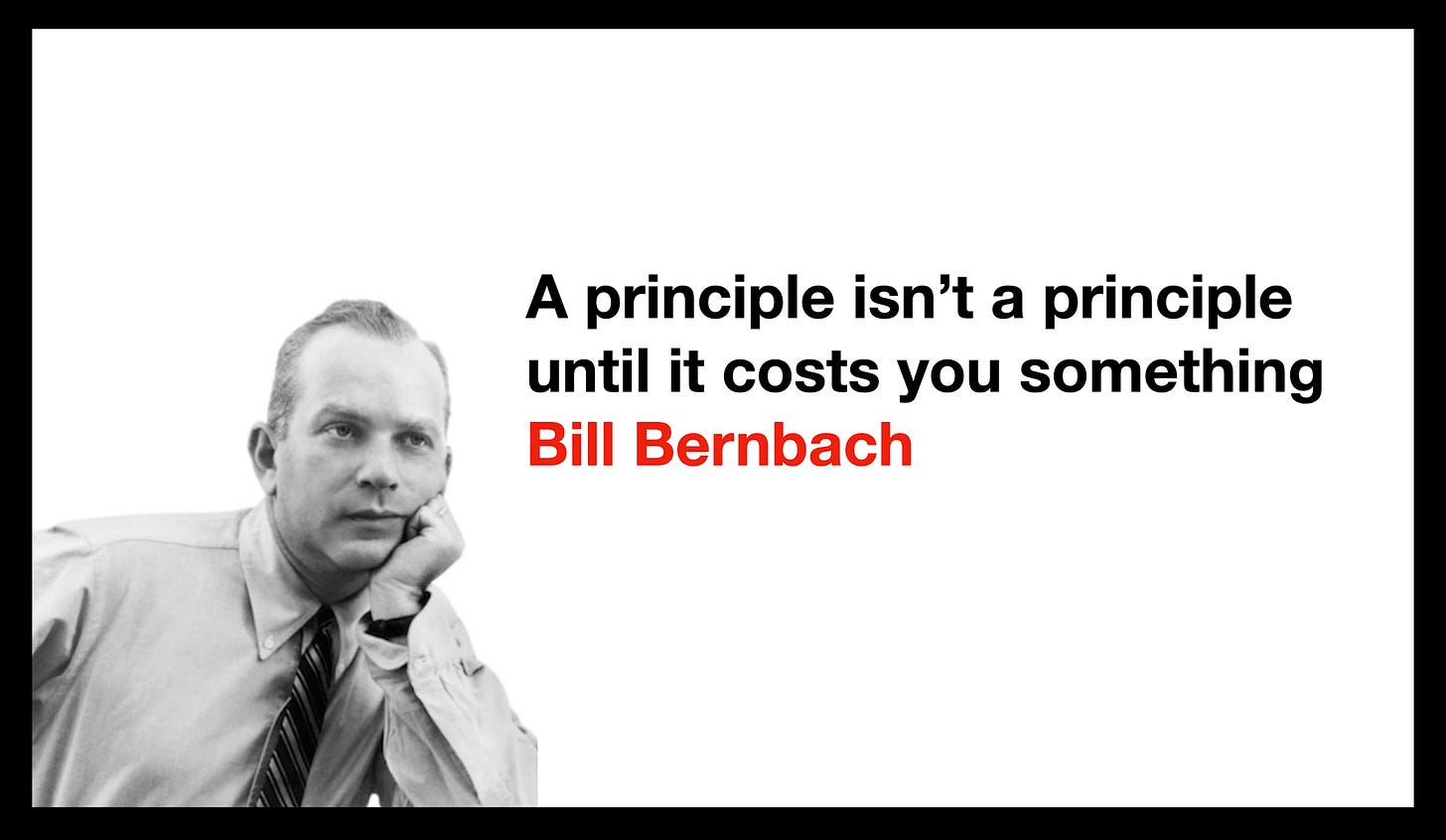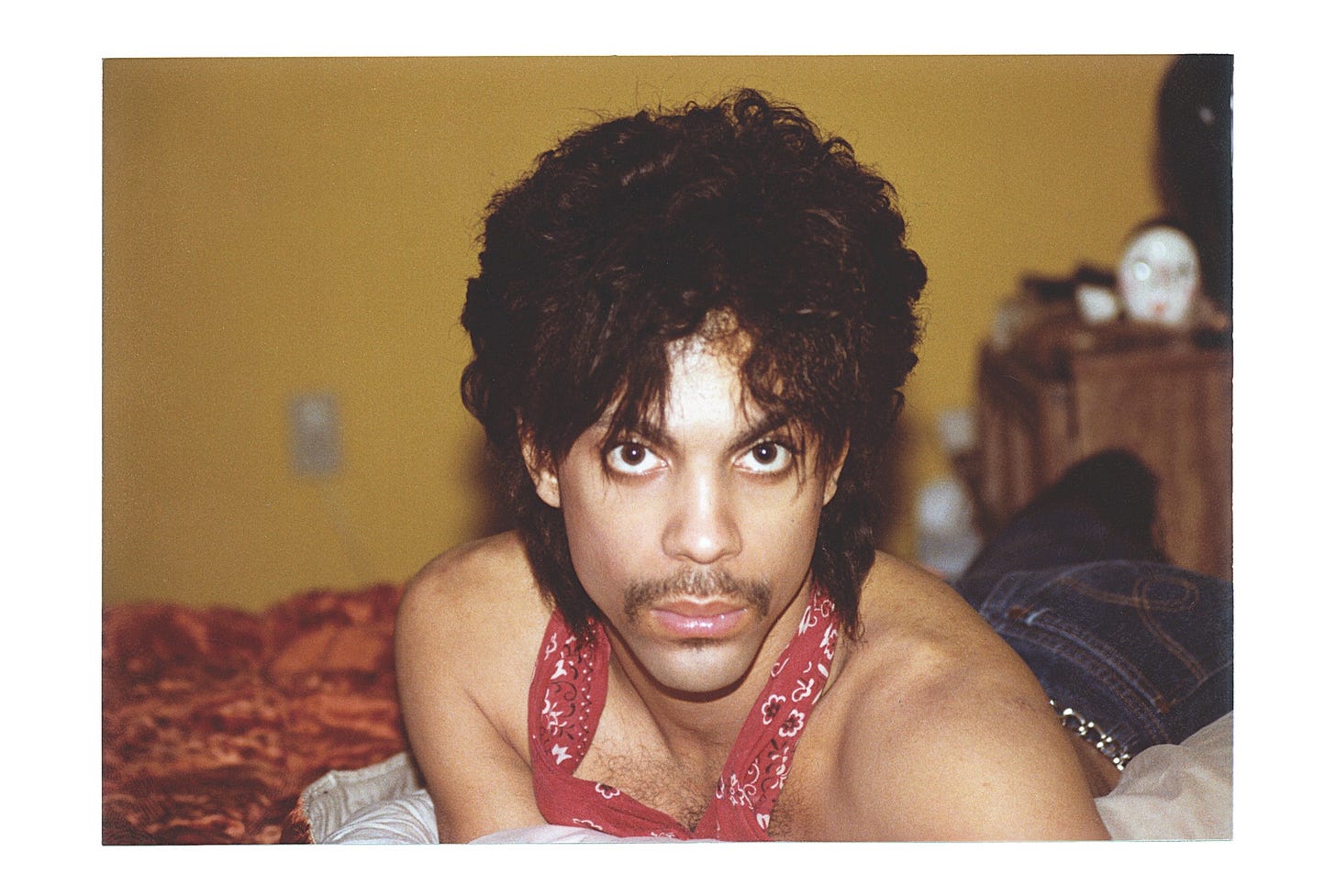Bi-Weekly-ish Newsletter #64: John Lewis's Century 🏪, Brand Purpose Pitfalls 🎭, Prince's Lost Doc 🎵, Spotify's Financials 📊, and Harari's 'Nexus' 📚
Hiya reader,
Edition number #64 here of the biweekly-ish newsletter by yours truly: Marcel Alexander Wiebenga.
New edition, same recipe of slow content for the soul that consists of 2009 words, 12,777 characters, and will take you about 7 minutes to read. It includes a new John Lewis ad, Prince, Spotify financials, the complicated relationship between brands and purpose, and Yuval Noah Harari and his new book Nexus.
Enjoy.
1. John Lewis: A Century of Consistency
When Old Becomes New Again
John Lewis dropped a new ad that celebrates the retailer's 100-year-old "Never Knowingly Undersold" pledge and is a prequel to its upcoming Christmas ad that John Lewis has previously set the bar for in terms big, epic and tear-jerking Christmas ads.
The film takes us through a century of British retail history, all viewed through a single John Lewis store window. We watch as the display changes over the decades, evoking a sense of nostalgia as it reflects each era's fashions, products, and cultural moments. From flapper dresses to wartime rations, Beatles-esque mop tops to modern gadgets. Laura Mvula's contemporary rendition of Paul Simon's "I Know What I Know" underpins this visual feast. It's a clever choice that bridges the gap between past and present, much like the ad itself.
Experience this journey through time yourself by clicking the link below.
This is an ad…
While John Lewis is celebrating its century-old pledge and prepping for another Christmas ad, at Ringo, we're setting our own bar in music licensing.
Imagine finding the perfect track for your project with the same consistency as John Lewis's "Never Knowingly Undersold" promise. That's where Ringo comes in. Our algorithmic pricing tool determines Expected Sync Value (xSV) with more precision than a John Lewis Christmas ad targets your emotions.
We're bridging the gap between artists and agencies, making sync licensing as reliable as John Lewis's 100-year commitment to value. No convoluted brand purposes or hidden vaults here - just straightforward, efficient, and fair music licensing.
Sign up now for early access. Your future self will thank you - and who knows, maybe you'll create the next ad campaign that sets a new industry standard.
2. Brand Purpose
The Road to Hell is Paved with Good Intentions
For those that know me personally and are following this newsletter, you know I'm skeptical about brands having a "purpose." My reasons are twofold: First, a brand is nothing more than an intersubjective truth among a group of people. It has no feelings, no conception of the world, and thus no opinion - so how can it have a purpose? Second, branded purpose often seems like another marketing ploy to sell more of an idea or its consequent products and to have its employees and suppliers more engaged.
This skepticism was recently reinforced by Greenpeace U.K.'s film "Toxic Influence: The Dark Side of Dove." The title says it all. Greenpeace's research found that Dove floods low-income communities every minute with 12,000 highly polluting plastic sachets. These super-polluting packets are choking oceans, killing wildlife, and fueling an environmental disaster. The very communities Dove claims to support are drowning in a sea of single-use plastic, their neighborhoods transformed into unofficial dumping grounds for corporate waste.
This disconnect between claimed purpose and reality isn't unique to Dove. I once saw a tea brand, Pickwick, use a Syrian refugee's tragic story in an ad. The commercial showed him kissing his newborn and asking to join a local football team after his own team was killed in a bombing in Aleppo. Pickwick called themselves 'the conversation starter.' It felt grossly exploitative and perfectly illustrates how brands can misuse serious issues for marketing gain.
These examples highlight a broader problem in purpose-driven marketing. While researching this topic, I came across Nick Asbury's work, particularly his Substack and book "The Road to Hell: How purposeful business leads to bad marketing and a worse world." Asbury raises several compelling points:
Purpose-driven marketing often leads to superficial, abstract messaging. Asbury notes: "You can see it in the language of some of the most prominent brands of the 2010s. Unlocking the potential of human creativity… giving people the power to build community… elevating the world's consciousness… It's all highly abstract and grandiose."
Companies build on weak foundations when they base their identity on a social purpose rather than their products or services. Hellmann's mayonnaise as a food waste crusader, anyone?
There's a disconnect between the proclaimed purpose and reality. Many businesses claiming a social purpose do little to change their practices or contribute meaningfully to their chosen causes.
Purpose-driven marketing tends to focus on the brand's moral narrative ("we believe," "our values") rather than addressing customer needs and wants.
Claiming moral high ground leads to noble cause corruption, where unethical actions are justified for a "higher purpose."
It's a complex issue, but one thing's clear: the road to hell is indeed paved with good intentions. Or in this case, with plastic sachets masquerading as social responsibility. Watch the Greenpeace film below. For a deeper dive, read Asbury's full 3-piece article here. Or grab his book from Amazon.
3. Prince: The Documentary We May Never See
Unveiling the Purple Vault
I recently came across a fascinating piece in the Eerste Hulp Bij Plaatopnamen newsletter referencing a New York Times Magazine article about a 9-hour Prince documentary that might never see the light of day (How meta!). This documentary, directed by Ezra Edelman (the mastermind behind "O.J.: Made in America"), is supposed to be an unprecedented look into Prince's life and art, including access to his legendary vault at Paisley Park and offers a unique, unfiltered perspective on Prince, delving both into his musical brilliance and his personal complexities. It features interviews with close associates, family members, and ex-lovers, painting a picture of a man who was simultaneously brilliant, controlling, and deeply vulnerable.
The film, however, faces significant hurdles. Prince's estate objects to its portrayal of the artist, leading to a standoff with Netflix, which owns the rights to the documentary. Prince might not have been the nice guy we'd like him to be, and the article closes with a profound reflection that stuck with me:
"Whatever chaos was unfolding in the corners of Paisley Park, in public Prince alchemized it into singing that was majestic and generative and leapt over walls. The film shows, more movingly and convincingly than almost anything I've seen, how life can illuminate art, and yet how separate the two things really are."
It's a shame we miss out on this in-depth look at one of music's most enigmatic figures. But perhaps, in true Prince fashion, it'll surprise us all and emerge when we least expect it. And who knows, maybe… just maybe, it'll reference this newsletter for total meta effect.
You can find the full article for those interested in diving deeper here. It's a long read but worth it for any Prince fan or music history buff. Meanwhile, watch Prince astonish the who's who (or once was) of music, jamming on "While My Guitar Gently Weeps." You probably saw it, but you can never see it enough.
4. Spotify's Q2 2024: Streaming Success or One-Hit Wonder?
From Layoffs to Lambos: Spotify's Financial Rollercoaster
I was recently geeking out over App Economy Insights as a brilliant way to visualize complex money flows. After all, if you want to understand the world, you've got to follow the cash. While their content is usually paywalled, they've dropped Spotify's Q2 FY2024 breakdown for free.
Understanding the Spotify Q2 FY2024 Earnings: Spotify has doubled its stock value in the past year, overcoming a tough 2023 with layoffs and challenging market conditions. CEO Daniel Ek emphasized that while Spotify is known for its great product, the business is now proving its financial strength, with rising margins and cash flow. However, despite these gains, growth in mature markets (like North America and Europe) is slowing, signaling saturation. Developing markets offer growth but with lower Premium conversion and weak ad monetization.
Key Highlights:
MAUs: Up 14% to 626M, but Premium growth (12% YoY) is softening in key markets.
Revenue: €3.8B (+20% YoY), driven mainly by Premium subscribers.
Challenges: Monetizing ad-supported users remains an issue, with slower growth in ad revenue compared to competitors like Meta.
Opportunities: New subscription plans (Audiobooks, Family) and a focus on creator monetization offer growth potential, but execution is critical.
Artist Payouts: Spotify has paid out over $40 billion to rights holders since its inception, with $9 billion in 2023 alone. Yet, the debate over fair compensation for artists rages on.
The Growth vs. Layoffs Conundrum: Despite user growth, Spotify laid off 17% of its workforce in December 2023. This paradox highlights the complex balance between expansion and profitability in the tech sector.
Why this is important: Spotify's performance is more than just numbers - it's a forerunner for the entire music industry. Their successes and struggles ripple through the ecosystem, affecting everyone from indie artists to major labels. As Spotify goes, so goes a significant portion of the music world.
Looking Ahead: As competition from TikTok Music looms and Spotify leans more on advertising, the platform needs to innovate and diversify beyond its current offerings. Despite positive financial indicators, user growth trends and the ability to balance growth with operational efficiency will be crucial to watch as Spotify navigates market saturation and competitive pressures.
Want to dive deeper into Spotify's financial symphony? Check out the full breakdown from App Economy Insights here. It's got more charts than a Billboard Top 100 and more insights than a producer's mixing board. Now, I need to update my playlist and ponder whether my Spotify subscription is helping Daniel Ek buy his next yacht or supporting my favorite indie band.
5. Yuval Noah Harari's "Nexus": Connecting the Dots of Human History
From Stone Age Networks to AI-Driven Societies
I’ve mentioned Yuval Noah Harari's in quite some previous newsletters. Harari's work has fundamentally influenced how I view our daily interactions. It's made me more aware of the 'shared fictions' we all participate in, from money to corporations to nations. It's a perspective shift that, once you see it, you can't unsee.
His latest book, "Nexus: A Brief History of Information Networks from the Stone Age to A.I.," continues to expand on themes from "Sapiens" and "Homo Deus," focusing on how information networks have shaped human history. I'm about a third through "Nexus," and it's fascinating how Harari connects historical events like the invention of the printing press and the witch hunts to modern phenomena such as the development of A.I. and Qanon-like conspiracy theories. It's like Harari is the world's most ambitious connect-the-dots puzzle solver, linking cave paintings to cat memes in one grand historical arc.
To promote the book, Harari is on a podcast bender and recently appeared on the "Diary of a CEO" podcast, discussing the themes of this book and explaining how his main concern is how these technologies are exploiting human emotions to drive societal divisions through an information overload. He says and I quote:
“We basically need to go on an information diet. [...] The idea that more information is always good—no. We actually need more time to digest the information and we have to be, of course, also careful about the quality of what we take in.”
If you're interested, you can find "Nexus" on Amazon, Bol.com, or even better at your local bookshop, or you can google "Harari + Nexus + PDF" if you want to be cheap about it. The Podcast is linked below and provides an excellent introduction to his ideas.
That's all for this edition. Whether you're contemplating the purpose of brands, mourning the Prince documentary we may never see, or pondering Spotify's next move, remember to keep your critical thinking cap on and your playlists fresh.
Until next time.
Marcel
P.S. If you enjoyed this newsletter, why not share it with a friend who could use a bi-weekly dose of cultural insight? And as always, your thoughts and feedback are welcome - hit reply and let me know what resonated (or didn't) with you this bi-week.







DEFINITELY will be sharing about the Prince doc to our community. Thanks for shedding light on the some interesting ideas!